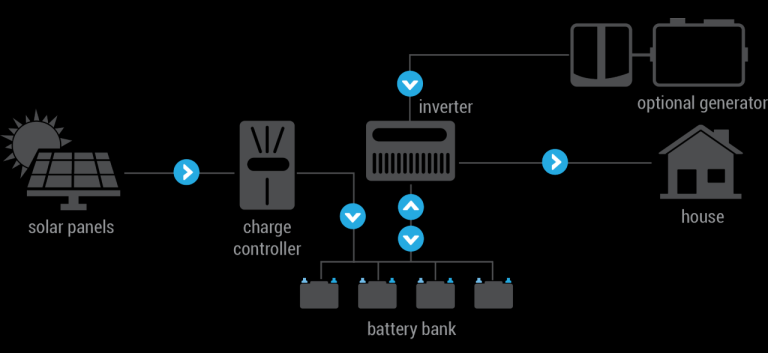Introduction
As the world shifts toward sustainable energy practices, off-grid energy solutions have gained prominence. Lithium batteries play a crucial role in powering these systems, providing reliable energy storage for remote locations where traditional grid connections are impractical or unavailable. This article explores the benefits, applications, and future trends of lithium batteries in off-grid energy solutions.

Why Choose Lithium Batteries?
Lithium batteries offer several advantages over traditional lead-acid batteries and other energy storage options, making them ideal for off-grid applications.
- High Energy Density
Lithium batteries have a significantly higher energy density compared to lead-acid batteries. This means they can store more energy in a smaller, lighter package, which is particularly beneficial for off-grid systems where space is often limited. Their compact design makes transportation and installation easier, especially in remote locations.
- Long Cycle Life
Lithium batteries typically have a longer cycle life, meaning they can be charged and discharged many more times than lead-acid batteries before their capacity significantly diminishes. This longevity translates to lower replacement costs and reduced maintenance efforts, making them more cost-effective over time.
- Faster Charging
Lithium batteries can charge more quickly than traditional batteries, allowing for faster replenishment of stored energy. This feature is particularly important in off-grid scenarios where power availability may be intermittent. Quick charging ensures that energy systems can respond effectively to varying energy demands.
- Low Self-Discharge Rate
Lithium batteries have a low self-discharge rate, meaning they retain their charge for longer periods when not in use. This characteristic is particularly advantageous for off-grid applications, where energy may need to be stored for extended periods before being utilized.
Applications of Lithium Batteries in Off-Grid Solutions
Lithium batteries are increasingly being used in various off-grid applications, contributing to energy independence and sustainability.
- Renewable Energy Systems
Lithium batteries are often paired with renewable energy sources like solar panels and wind turbines. In these systems, batteries store excess energy generated during peak production times for use during periods of low generation. This setup maximizes the efficiency of renewable energy systems, providing a reliable energy supply for homes and businesses.
- Remote Cabins and Homes
For individuals living in remote cabins or off-grid homes, lithium batteries offer a practical solution for powering essential appliances, lighting, and heating. Their compact size and efficiency allow homeowners to create a sustainable energy system that meets their needs without reliance on conventional power sources.
- Telecommunications
Telecom infrastructure often relies on off-grid solutions to maintain connectivity in remote areas. Lithium batteries provide backup power for telecommunications equipment, ensuring reliable service even during outages. Their durability and long lifespan make them ideal for this application, where uninterrupted power is critical.
- Electric Vehicles and E-Bikes
Lithium batteries power electric vehicles (EVs) and e-bikes used in off-grid environments. These batteries enable users to travel longer distances without worrying about charging infrastructure, providing mobility in areas where traditional vehicles may struggle.
Advantages of Off-Grid Lithium Battery Systems
Integrating lithium batteries into off-grid energy solutions offers several key advantages:
- Sustainability
By combining lithium batteries with renewable energy sources, off-grid systems promote sustainability and reduce reliance on fossil fuels. This integration contributes to lower carbon emissions and helps combat climate change.
- Energy Independence
Off-grid solutions equipped with lithium batteries empower users to become self-sufficient. This independence is especially valuable in remote areas where access to traditional power sources may be limited or unreliable.
- Scalability
Lithium battery systems can be easily scaled to meet increasing energy demands. Whether for a small cabin or a large renewable energy installation, users can adjust the system’s size by adding more battery capacity as needed.
- Reduced Environmental Impact
Lithium batteries have a longer lifespan and lower maintenance requirements than traditional batteries, leading to less waste over time. Additionally, advancements in recycling technologies are making it easier to recover valuable materials from used lithium batteries, further reducing environmental impact.
Challenges and Considerations
Despite their advantages, there are challenges associated with lithium batteries in off-grid applications:
- Initial Cost
Lithium batteries typically have a higher upfront cost compared to lead-acid batteries. While their long lifespan and lower maintenance needs can offset these costs over time, the initial investment may be a barrier for some users.
- Temperature Sensitivity
Lithium batteries can be sensitive to extreme temperatures. Performance can decline in very hot or cold conditions, making it essential to consider temperature management strategies when designing off-grid systems.
- Recycling and Disposal
As lithium battery usage increases, so does the need for effective recycling and disposal solutions. Developing sustainable methods for handling end-of-life batteries is crucial to minimize environmental impact and recover valuable materials.
Future Trends in Off-Grid Lithium Energy Solutions
The future of lithium batteries in off-grid energy solutions is promising, with several emerging trends:
- Technological Advancements
Ongoing research and development are leading to improvements in lithium battery technology, including enhanced energy density, faster charging, and improved safety features. These advancements will further expand the applications and viability of lithium batteries in off-grid systems.
- Integration with Smart Technologies
The integration of lithium batteries with smart energy management systems is becoming more common. These systems can optimize energy use, track battery performance, and automatically manage energy distribution, enhancing overall system efficiency.
- Increased Adoption of Renewable Energy
As the adoption of renewable energy continues to grow, the demand for efficient energy storage solutions like lithium batteries will rise. This trend will drive further innovation and investment in off-grid energy technologies.
Conclusion
Lithium batteries are revolutionizing off-grid energy solutions, providing reliable, efficient, and sustainable power for a variety of applications. Their advantages in energy density, longevity, and charging speed make them ideal for integration with renewable energy systems and other off-grid technologies.
While challenges remain, advancements in battery technology and increasing awareness of sustainable practices are paving the way for broader adoption. As we move toward a future that prioritizes energy independence and environmental sustainability, lithium batteries will play a vital role in shaping off-grid energy solutions.

